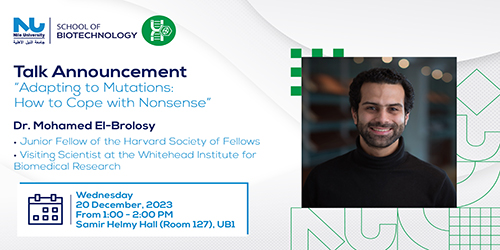

"Adapting to Mutations: How to Cope with Nonsense" Seminar by Dr. Mohamed El-Brolosy
NU School of Biotechnology is pleased to host a seminar presented by Dr. Mohamed El-Brolosy, a junior fellow of the Harvard Society of Fellows and a visiting scientist at the Whitehead Institute for Biomedical Research. Dr. El-Brolosy will give a talk entitled "Adapting to Mutations: How to Cope with Nonsense" on Wednesday, December 20th, at 1:00 P.M. in UB1 Room 127.
Dr. El-Brolosy completed his Ph.D. in 2020 at the Max Planck Institute for Heart and Lung Research in Bad Nauheim, Germany. Before that, he pursued his bachelor's degree in pharmacy and biotechnology at the German University in Cairo, Egypt (2014), followed by a master's degree in molecular biology at the International Max Planck Research School in Göttingen, Germany (2016). Dr. El-Brolosy has received recognition for his work, including the Max Birnstiel Award (2019), the Otto Hahn Medal (2021), the Peter Hans Hofschneider Prize (2021), the Elisabeth-Gateff-Prize from the German Genetics Society (2021), and the Bayer Pharmaceuticals Award from the German Society of Biochemistry and Molecular Biology (2022). He was also listed in the 2020 Forbes Under 30 list, and the 2020 MIT Under 35 Innovators list for the MENA region.
Dr. El-Brolosy’s research is dedicated to unraveling mechanisms of genetic robustness, in particular, how cells and organisms adapt to protein-coding mutations to prevent defects and diseases. During his graduate studies, he discovered an intriguing phenomenon called transcriptional adaptation where nonsense mutations can lead to increased expression of functionally related genes, compensating for the mutated gene's function. Mechanistically, he identified a previously unknown role for mutant mRNA degradation in triggering this response. His ongoing work involves further characterizing the molecular machinery underlying this machinery and investigating its potential therapeutic implications. He believes this discovery can lead to a better understanding of disease-causing mutations and potentially lead to improved treatments for patients with genetic disorders. In this talk, he will discuss his work on genetic compensation, and touch on bio-entrepreneurship.
We cordially invite all students and staff members to attend this highly awaited session which will shed the light on enlightening breakthroughs in the field of biomedical science.